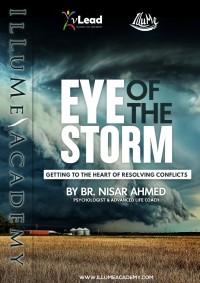Shabnam: "Yes it is ..."
Riyaz: "No it isn't..."
Shabnam: "The trouble with you is ..."
Riyaz: "Why do you always have to be so selfish?"
Shabnam: "I'm a straightforward person; I'll speak the truth no matter who it is..."
Riyaz: "Straightforward? (phew) what you did last Sunday was it ...."
Shabnam: My problem with you is that you never ...."
Riyaz: "Whenever you speak like that you just sound like your mother and I just ...."
Shabnam: "What is your problem with my mother? Have I ever ...."
Riyaz: "Can't you just stop arguing? After all that I have ...."
Shabnam: "What have you ....."
And the story goes on. Most of the time, it starts off small and then ends up in the all too predictable situation of a bout starting, which some try to avoid, some look forward to avenge, but nobody likes it. Yet, with an unforgiving attitude, every single action is a potential trigger for the entire argument to start over. With dark emotional clouds of sadness, anger, guilt, rejection, suppression and helplessness hovering over you, you find yourself amidst a storm that is violently shattering your life, tearing your family apart and destroying your dreams. Amidst this storm, you end up feeling frustrated, helpless in understanding what just happened, and how suddenly all that you worked towards has come to nothing, and the ones you loved dearly suddenly seem like strangers.
Sounds familiar? This is a common scenario in many homes today and the percentage, intensity and frequency is only on the rise. And when a society is made with such highly stressed people who are stuck, stranded and helpless in resolving their own family issues, how are they going to tackle the larger issues that our ummah faces?
Muslims are an ummah of action they should neither be aggressors nor the victim and definitely should not be passive spectators; they should take charge of their situation. And the first step towards this change is to seek the right knowledge. Conflict Resolution / Reconciliation is a critical skill that should be taught in families (by elders), schools and madrasas.
Why Learn Conflict Resolution?
Hujuraat: 10 - The believers are nothing else than brothers (in Islâmic religion). So make reconciliation between your brothers, and Fear Allah that you may receive Mercy.
Reconciling is a command, yet how many of us know how to implement this verse? You reach for help only after the damage done is beyond repair.
What will you learn?
- Understand the psychology of conflict & the people caught in conflict
- Realize what’s your style of handling conflict & it’s impact.
- Get to the core to understand the real needs & concerns of people in conflict
- To be strong, yet flexible to move from conflict towards resolution
Who can benefit?
You can benefit, if
- You are above 16 years of age
- You are in conflict with someone (that someone may be yourself)
- You want to help your close ones who are facing an issue
- You are in a situation where you have to mediate between two people
- You are going to get married
- You are just interested in learning about the real nature of people and conflicts

